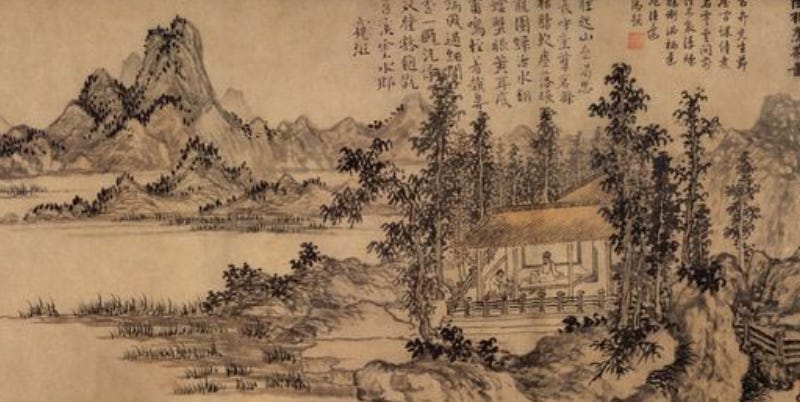On Tea, Addiction, and Offering
Transforming Addiction into Admiration
This is a bite-sized blog that I wrote during a tea break—a lesson on freedom from addiction, but by transformation, not abstinence. Because what is life without its gifts? Inspired by Shaan Puri, I’m exploring these short-reads as a way to deliver a strong message unveiled by daily experiences. I hope it’s received with an open heart, and if you enjoy it, please vote below. Thank you.

I drink a lot of tea. Not too long ago, I was addicted to it — and to coffee. Coffee, however, I gave up nearly seven months ago. Soon, I may try it again. Tea I have continued, thanks to many decaffeinated varieties. Yet even with these, there was a time I craved tea terribly.
Tea became my morning revival, my afternoon escape, and my evening decompression. When I tried to go without it, the craving would tap on my shoulder all day, demanding attention I could not ignore.
Of course, tea is a healthier choice than the stronger stimulants it replaced. But it wasn’t the substance that needed changing — it was my dependence. And recently, by grace, that dependence has shifted. My relationship with tea has been redeemed.
Why write about this now? Because as I sit here with a cup of tea, I’m moved to reflect — and to share the simple method that has helped free me from many such addictions.
Where did the chaos begin? I drank tea with my own pleasure as the goal — and my “pleasure bucket” is a bottomless pit. Under stress or strain, it became even deeper, and my dependency only deepened it, even if temporarily raising the floor.
The key shift was this: to drink tea for the sake of the tea — not for myself.
I know how odd that may sound. Tea is inanimate. It is a gift for us to enjoy — yes. But the role of the recipient of a gift is not simply to take and consume. It is also to offer back.
This offering can be transactional or synergistic — and the latter is where transformation lies. In a transactional exchange, we may offer gratitude in return for the gift. But gratitude alone can feel hollow, especially when we cannot summon it sincerely.
The richer path is to offer the gift itself back to its true source.
The ancient Chinese tea masters spoke of a Spirit of Tea. They treated tea with reverence — not as a mere commodity, but as something to be received with responsibility and care. Perhaps it is for this reason that tea has blessed their culture so richly across the centuries, from the Zhou Dynasty onward.
I cannot match their exaltation of tea. But I have found a higher Recipient to whom I offer every cup: God.
Now when I drink tea, I do so with the intention to offer it back — in thanks, in joy, in reverence. I begin by opening myself to the message the tea carries. I sit quietly with pen and paper, sipping with an open heart, ready to listen — and to give back.
I discovered that tea is a vessel of love — like a capillary. Love flows toward the recipient, but must also flow back to the source. When I quieted my mind and softened my heart, I was given this line:
"It tastes as if the smell of the flowers that could never quite satiate my curious nostrils has been given to me as a liquid explanation — it gives to the longing in my chest what the floral aroma could not."
Through this shift, my addiction has begun to dissolve. I can now put my empty cup down and feel full.
The change comes from moving from a mindset of scarcity to one of abundance. Tea — like everything in creation — overflows with love. But to receive it rightly, we must first recognize that we are unworthy of such love. And in this humble recognition, we offer back what we can, pouring our heart into that offering.
In this synergistic flow — receiving and returning — we find true fulfillment. And through this, we are freed.
Discussion Section
Thanks for taking the time to read this bite-sized blog! This is the discussion section, where you’ll find links to books, polls, and discussion questions. Enjoy :)
Nowadays An Illustrated Modern Reader of The Classic of Tea can be found in my left hand every time there is tea in my right. It is an annotation of the first ever book published about tea in 760CE during the Tang Dynasty.
Question 1: Is there something simple in your daily life — like tea, coffee, music, or a daily ritual — that you’ve sometimes found yourself relying on a little too much? How has your relationship with it changed over time?
Question 2: Have you ever noticed that when you slow down and really pay attention to something (a cup of tea, a walk, a conversation), it seems to "give" you more than you expected? What was that like?
Question 3: How might your experience of small pleasures change if you treated them less like something to "consume," and more like a small moment to savor and appreciate?
If you enjoyed this new style of blog, please let me know 👇



